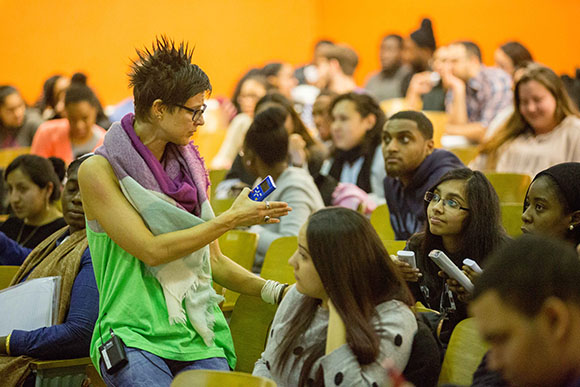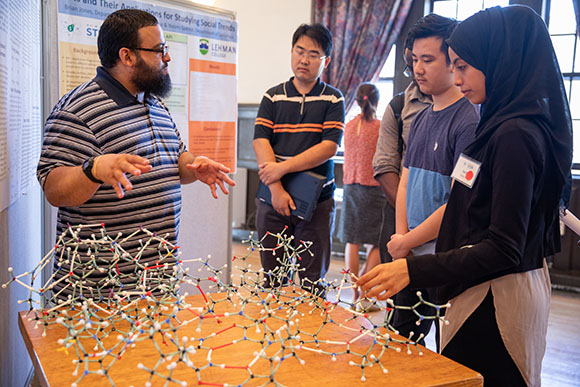|
|
|
|
Momentum Newsletter
Last year, I announced an ambitious plan to grant 90,000 degrees and high-quality certificates by the year 2030—Lehman’s 90x30 initiative. The success of our students, while in college and upon graduation, is integral to this goal. Even before I introduced 90x30, the college was implementing new infrastructures, curricula, and programs to increase student achievement and graduation rates. These developments, and the advances achieved across all areas of the college in the past year, are already yielding positive results. The ongoing efforts of Lehman’s dedicated faculty, administrators, and staff to help realize our 90x30 goal deserve attention and applause. I am delighted to share but a sample of this important work with the campus community in this issue of Momentum.
Serving Our Students
First, Lehman has retooled and restructured its technology and administrative resources to better serve students’ needs, increase retention, and promote timely graduation. In May 2018, for example, the Office of the Registrar transformed its existing Graduation Audit Unit, which monitored students’ graduation eligibility, into a Graduation Specialist (GS) team. This was far more than a name change.
In CUNY, students declare their major once they have reached 60 credits. However, they often encounter roadblocks at this stage of their college experience. The need to enroll in major-required courses, for instance, can conflict with demands to complete some of the lower-level courses required for all degrees. As a result, students may take longer to progress through their major, or reach their senior year missing some graduation requirements. The GS team collaborates with the college’s five schools to identify cohorts of undergraduate junior-level students, as well as graduate students, in each major. A Graduation Specialist will work directly with students in a cohort to identify gaps that may delay academic progress; they also plan, organize, and coordinate activities that help generate and sustain students’ academic motivation and movement. Earlier interventions are far more effective than those implemented later on, when a student is already preparing to complete a degree. The goal for the GS model is to pave the road toward graduation and make a student’s transition to the final year as seamless and transparent as possible.
In addition, data is collected throughout this process and analyzed for “trending” issues among cohorts. These trends are communicated back to the schools and departments in order to provide them with the information they need to best serve students.
In 2017, Lehman debuted Lehman 360, an online platform designed with and for students, faculty, and administrators that provides a “one-stop-shop” for the relevant information these constituencies need to ensure students’ academic progress and achievement. Lehman 360 delivers data from multiple systems into a single location and includes personalized information, along with simple data visualizations, about GPA, academic standing, course schedules, and financial aid. The platform also enables targeted notifications, so that students can learn about internship and scholarship opportunities, receive reminders to declare their major, monitor their overall academic progress, and communicate with their advisors and professors. The award-winning platform was developed in-house by Lehman’s Division of Information Technology.

Success Initiatives in the Schools
Each of Lehman’s five schools is focusing on providing avenues to student success in college and after graduation through restructured coursework, external collaborations, enhanced programming, and professional development. Here is a small selection of the great work being done in the schools to support Lehman students.
In the School of Education, NYC Men Teach—a program developed by CUNY and the Mayor’s Office—is drawing academically-promising students of color, especially men, in an effort to produce a diverse pool of highly-qualified educators for New York City’s public schools. NYC Men Teach at Lehman employs a comprehensive approach that fosters student success through academic, professional, and financial support. These resources, combined with culturally-relevant learning environment and programming, support students’ character development, peer relationships, and self-awareness, and increase their momentum toward graduation and a teaching career.
The School of Continuing and Professional Studies (SCPS), working with the Department of Computer Science, oversees CUNY 2X, a grant-funded program that provides all computer science majors at Lehman academic and professional development resources to enhance their course work and give them an edge in the growing tech job market. Skill-building boot-camps, professional networking, dedicated career coaching, and a “tech-in-residence” lecture series also prepare students to apply for the Tech Talent Pipeline, a cohort-based program that primes juniors and seniors for competitive tech careers and places them into internships once they graduate.
In Arts and Humanities, students working in a range of performing arts at Lehman are benefitting from a growing number of creative experiences, internships, and mentorship opportunities available to them, and are presenting more independent creative works than ever before through senior recitals, research presentations, and devised multimedia projects. These are the culmination of important capstone projects that students include in their professional portfolios, which help them take the next step as independent creative artists, or incorporate into graduate school applications.
In the School of Health Sciences, Human Services, and Nursing, the Department of Social Work recently instituted undergraduate curriculum changes to provide a more focused learning experience for students. These include a new discipline-specific research course, so that students can become familiar with conducting the kind of research they will engage in should they attend graduate school. Undergraduate research opportunities are proven to increase student success in graduate study, and open doors to a wider range of career opportunities.
The dynamic restructuring of a general chemistry course in the School of Natural and Social Sciences is promoting students’ success in this gateway course, which is required for future STEM majors. The course and curriculum were redesigned to accommodate the “flipped classroom” model, which uses educational technology and active learning to increase student engagement and content retention. Course material is provided asynchronously (online), and class time is devoted to activities such as quizzes, discussion, and small group work, all of which promote deeper learning. Before the course was restructured, passing rates were below 60%—low enough to prevent otherwise talented students who failed the course from pursuing STEM majors. After the course was flipped, passing rates jumped to 80-85%, including students who had underperformed on college entrance exams.
 LS 113 2018 STEM Summer REU Showcase LS 113 2018 STEM Summer REU Showcase
CUNY Partnerships
Lehman is also collaborating with other CUNY institutions and external partners in programs that boost student success.
Earning a college degree in four years can be a challenge for many Lehman students. However, an extended time-to-degree may have long-term implications for a student’s financial stability and future earning potential. Last month, we announced that the first $1.1 million of a renewable grant totaling $4.2 million secured by CUNY from the Robin Hood Foundation, on behalf of Lehman College, will establish the Accelerate, Complete, and Engage (ACE) program at Lehman. Lehman is the second CUNY institution to offer the ACE program; it has already shown promise at John Jay College of Criminal Justice for increasing retention, narrowing achievement gaps, and helping students successfully navigate common roadblocks that delay graduation or force them to drop out of college.
Beginning in fall 2019, ACE initially will support a group of 250 new full-time students for up to four years and new transfer students for up to two years. Funds will cover “hidden” costs that may amount to real barriers for students striving to finish their degree in four years. These include the cost of MetroCards, laptops, textbooks, and registration fees, along with the gap between full-time tuition and financial aid packages. The ACE program also supports students through structured full-time degree pathways, consolidated course schedules, first-year blocked courses, intrusive advisement, academic support and career development services, and a cohort model to foster engagement and build a connected community. The goal for ACE at Lehman is to double on-time graduation rates from 24% to 50% of students, and accelerate progress toward achieving 90x30.
The Pathways to Student STEM Success Program (PTS3) is a five-year partnership between Lehman, Hostos, and Bronx Community Colleges aimed at reducing barriers to student progress and success in STEM fields. PTS3 was created not only to advance academic achievement but also to motivate students to excel in areas beyond focused academic study. The program engages low-income and Hispanic postsecondary students with innovations in student support, instruction, and curriculum, and a “cultural capital” element to increase students’ knowledge about STEM education and careers. In its first two years, participating students were able to place out of College Algebra—a prerequisite course for aspiring STEM majors that does not satisfy the math requirements for STEM degrees. More than 91% of students in the program (123) improved their math skills well enough to test into higher-level courses.
Another CUNY initiative in STEM that promises to impact student achievement is the revamped Louis Stokes Alliance for Minority Participation (LSAMP) program, a cross-institutional project for which Lehman is now the lead CUNY institution. The program also includes nine senior colleges, three community colleges, and the Macaulay Honors College. Funded by the National Science Foundation, LSAMP’s goal is to increase the number of underrepresented minority students graduating with high-quality degrees in STEM. The changing needs of CUNY students demanded that the program be restructured to include freshman student recruitment and ongoing research support. By offering early support, along with mentoring to stimulate learning and strengthen students’ academic and research skills, Lehman and its partner schools will attract, engage, recruit, and retain even more students and shepherd them toward degree completion. Our objective is to double the LSAMP student graduation rates to 360 students per year throughout the participating institutions, while ensuring that students are prepared for professional careers or advanced graduate study in STEM fields.
Today’s Lehman students experience the world in a vastly different way than those of even a decade ago. Mission-driven public institutions like ours must use the resources we already have at hand—including faculty expertise, technology, data, external partnerships, and creative thinking—to develop and secure funding for programs that serve our students’ needs, ensure their success in school and upon graduation, and advance the level of academic excellence for which the college is known.
I look forward to sharing additional examples of how our Lehman campus community is working to solidify the college’s standing as one of our nation’s top engines of opportunity. Until then, thank you for all you do, day-in and day-out, to advance our mission and accelerate our progress on so many fronts.
Sincerely,
José Luis Cruz
@LehmanPresident
Previous messages from President Cruz can be found here. |
|
|
|